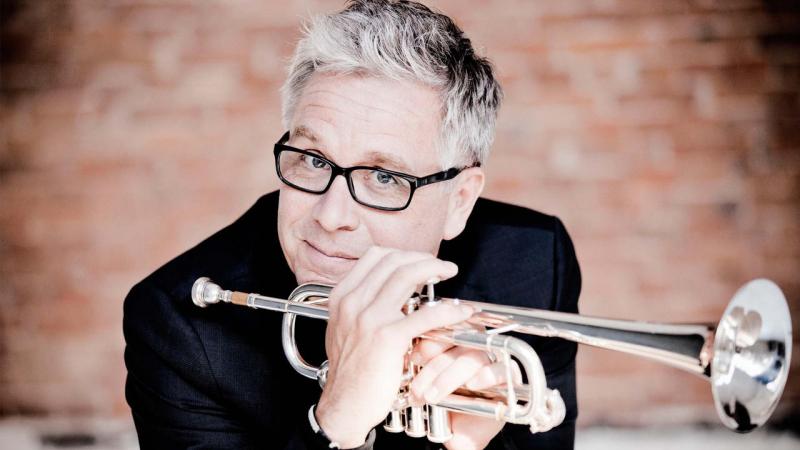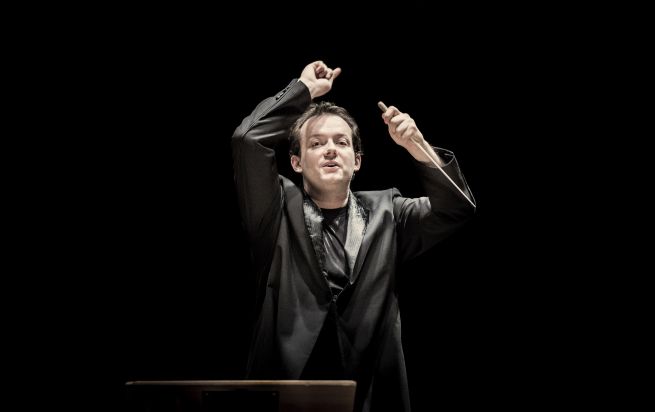Hardenberger, Philharmonia, Nelsons, RFH | reviews, news & interviews
Hardenberger, Philharmonia, Nelsons, RFH
Hardenberger, Philharmonia, Nelsons, RFH
Nelsons' Bruckner fails to convince

Bernd Alois Zimmermann’s Nobody knows de trouble I see is a popular concerto, but it’s an unlikely hit. Zimmermann maintains a distanced relationship with the spiritual on which the work is based, and, while there are jazz elements too, this is a long way from crossover.
Fortunately, both trumpeter Håkan Hardenberger and conductor Andris Nelsons (pictured below, image Marco Borggreve) have the measure of this music, giving a performance that fully acknowledges both the composer’s desire to connect with the radical jazz of the 1950s, and the loyalty to modernist conventions that prevent him from doing so. Hardenberger seemed more constrained than usual, effortlessly virtuosic, but without any flamboyant displays. The work has a pervasively dark mood that Hardenberger conveyed well, especially in the flat, broad tone that he applied. The orchestra is occasionally required to play the big band, with brass outbursts, and even a Hammond organ break at one point. But nothing here ever sounded laidback or casual. This was a performance fully in keeping with the spirit of the music, but what dark and unyielding spirit that is.
The Bruckner Eighth Symphony in the second half seemed a more attractive proposition, but failed to deliver. Nelsons’ approach to Bruckner is unusual. Where most conductors maintain a firm grip on the music’s large scale structure and progress while shaping individual phrases more intuitively, Nelsons puts all his structural rigour and energy into foreground concerns. So phrases are rarely allowed to play out at a natural pace, and cadences are frequently rushed or swallowed up into the texture. Even from the very opening of the work, the dotted rhythm theme in the lower strings sounded hectored and rushed, and most of what followed was very similar.

The second movement scherzo suffered least from Nelsons’ approach, and the steady pace, combined with a good bass tone from the lower strings, gave the music an appropriate sense of mechanistic propulsion. Adding a third harp helped to bring out their textures in the Trio and in the first part of the Adagio. But the remainder of the third movement was torpedoed by Nelsons’ erratic tempos, often speeding up the music simply because he didn’t seem to know what else to do with it. He used the Haas edition, an interesting and unusual choice. The main difference between this and the more standard Nowak is that many of the cuts to the Adagio and finale, which Bruckner himself sanctioned, have been opened out. But Nelsons failed to make a case for the longer Adagio, especially in the rambling and incoherent coda. So too with the finale, which also suffered from a lack of structural rigour and any real sense of direction.
None of this was helped by the surprisingly poor playing of the Philharmonia. Violin tone was weak throughout, especially in the Adagio, ensemble in the woodwinds was poor, the timpani was all but inaudible in the scherzo (although more prominent in the finale), and the brass tone at all the climaxes was ugly, with the trumpets frequently sharp.
This same orchestra has recently been giving stunning Bruckner performances under Christoph von Dohnányi, making Nelsons’ misjudged reading all the more frustrating. When it comes to Wagner, Mahler and Shostakovich, he’s a natural, but Bruckner remains a blind spot. Nelsons has recently been named Gewandhauskapellmeister, an appointment that comes with a heavy dose of Bruckner. Here’s hoping Leipzig audiences will be more convinced than I was.
rating
Share this article
Add comment
The future of Arts Journalism
You can stop theartsdesk.com closing!
We urgently need financing to survive. Our fundraising drive has thus far raised £49,000 but we need to reach £100,000 or we will be forced to close. Please contribute here: https://gofund.me/c3f6033d
And if you can forward this information to anyone who might assist, we’d be grateful.

Subscribe to theartsdesk.com
Thank you for continuing to read our work on theartsdesk.com. For unlimited access to every article in its entirety, including our archive of more than 15,000 pieces, we're asking for £5 per month or £40 per year. We feel it's a very good deal, and hope you do too.
To take a subscription now simply click here.
And if you're looking for that extra gift for a friend or family member, why not treat them to a theartsdesk.com gift subscription?
more Classical music
 Goldscheider, Brother Tree Sound, Kings Place review - music of hope from a young composer
Unusual combination of horn, strings and electronics makes for some intriguing listening
Goldscheider, Brother Tree Sound, Kings Place review - music of hope from a young composer
Unusual combination of horn, strings and electronics makes for some intriguing listening
 theartsdesk Q&A: composer Donghoon Shin on his new concerto for pianist Seong-Jin Cho
Classical music makes its debut at London's K-Music Festival
theartsdesk Q&A: composer Donghoon Shin on his new concerto for pianist Seong-Jin Cho
Classical music makes its debut at London's K-Music Festival
 Helleur-Simcock, Hallé, Wong, Bridgewater Hall, Manchester review - moving lyricism in Elgar’s concerto
Season opener brings lyrical beauty, crisp confidence and a proper Romantic wallow
Helleur-Simcock, Hallé, Wong, Bridgewater Hall, Manchester review - moving lyricism in Elgar’s concerto
Season opener brings lyrical beauty, crisp confidence and a proper Romantic wallow
 Kohout, Spence, Braun, Manchester Camerata, Huth, RNCM, Manchester review - joy, insight, imagination and unanimity
Celebration of the past with stars of the future at the Royal Northern College
Kohout, Spence, Braun, Manchester Camerata, Huth, RNCM, Manchester review - joy, insight, imagination and unanimity
Celebration of the past with stars of the future at the Royal Northern College
 Jansen, LSO, Pappano, Barbican review - profound and bracing emotional workouts
Great soloist, conductor and orchestra take Britten and Shostakovich to the edge
Jansen, LSO, Pappano, Barbican review - profound and bracing emotional workouts
Great soloist, conductor and orchestra take Britten and Shostakovich to the edge
 Jakub Hrůša and Friends in Concert, Royal Opera review - fleshcreep in two uneven halves
Bartók kept short, and a sprawling Dvořák choral ballad done as well as it could be
Jakub Hrůša and Friends in Concert, Royal Opera review - fleshcreep in two uneven halves
Bartók kept short, and a sprawling Dvořák choral ballad done as well as it could be
 Hadelich, BBC Philharmonic, Storgårds, Bridgewater Hall, Manchester review - youth, fate and pain
Prokofiev in the hands of a fine violinist has surely never sounded better
Hadelich, BBC Philharmonic, Storgårds, Bridgewater Hall, Manchester review - youth, fate and pain
Prokofiev in the hands of a fine violinist has surely never sounded better
 Monteverdi Choir, ORR, Heras-Casado, St Martin-in-the-Fields review - flames of joy and sorrow
First-rate soloists, choir and orchestra unite in a blazing Mozart Requiem
Monteverdi Choir, ORR, Heras-Casado, St Martin-in-the-Fields review - flames of joy and sorrow
First-rate soloists, choir and orchestra unite in a blazing Mozart Requiem
 Cho, LSO, Pappano, Barbican review - finely-focused stormy weather
Chameleonic Seong-Jin Cho is a match for the fine-tuning of the LSO’s Chief Conductor
Cho, LSO, Pappano, Barbican review - finely-focused stormy weather
Chameleonic Seong-Jin Cho is a match for the fine-tuning of the LSO’s Chief Conductor
 Classical CDs: Shrouds, silhouettes and superstition
Cello concertos, choral collections and a stunning tribute to a contemporary giant
Classical CDs: Shrouds, silhouettes and superstition
Cello concertos, choral collections and a stunning tribute to a contemporary giant
 Appl, Levickis, Wigmore Hall review - fun to the fore in cabaret and show songs
A relaxed evening of light-hearted fare, with the accordion offering unusual colours
Appl, Levickis, Wigmore Hall review - fun to the fore in cabaret and show songs
A relaxed evening of light-hearted fare, with the accordion offering unusual colours
 Lammermuir Festival 2025, Part 2 review - from the soaringly sublime to the zoologically ridiculous
Bigger than ever, and the quality remains astonishingly high
Lammermuir Festival 2025, Part 2 review - from the soaringly sublime to the zoologically ridiculous
Bigger than ever, and the quality remains astonishingly high

Comments
A grossly unfair review of
I must endorse the comments
I’ve tried posting a comment